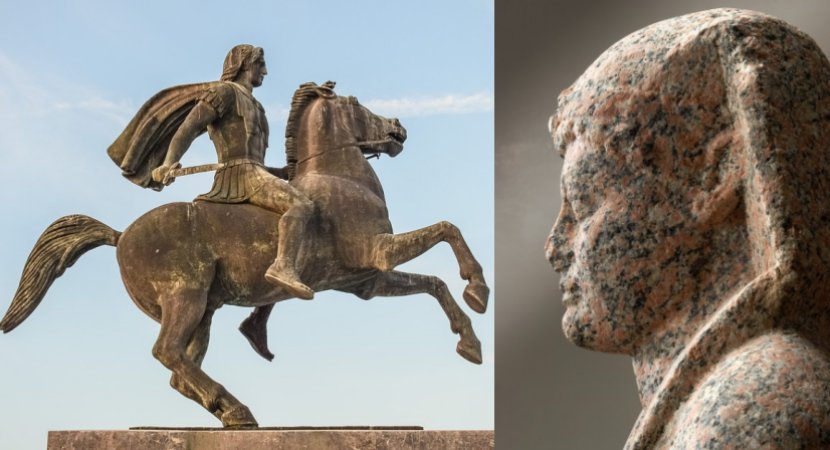Alexander The Great Was Crowned Pharaoh And Declared Son Of God Amun
Conny Waters - AncientPages.com - Not all pharaohs were of Egyptian origin. Alexander III of Macedon, known as Alexander the Great (356 - 323 BC), was crowned pharaoh and declared the son of God Amun in ancient Egypt.
In May 334 B.C., Alexander the Great began his invasion of the Persian Empire. In the Battle of the Granicus, he defeated Darius III, the last king of the Achaemenid Empire.
Left: Statue of Alexander the Great, Thessaloniki, Greece, Image Credit: Public Domain. Right: Alexander the Great as pharaoh. Image credit: Public Domain
The battle took place in Northwestern Asia Minor, near the site of Troy, and was the first of three major battles fought between Alexander the Great and the Persian Empire.
It was a battle in which Alexander the Great came close to failure and death. However, he survived, and after the victory, he set eyes on Egypt.
Alexander the Great’s victory over the Persians welcomed ancient Egypt, which was no longer a dominating kingdom after being conquered earlier by the Persians. So, when Alexander the Great entered Egypt, people saw him as a liberator who had freed the Egyptians from many years of brutal oppression at the hands of the Persian Empire.
In the Autumn of 332 B.C., Alexander the Great, who was only 24 years old at the time, was crowned pharaoh in Memphis. He visited the Temple of the Oracle of Amun in the Western Desert of Egypt, not far from the border of Libya. The great Macedonian conqueror was declared the son of the god Amun. This was a special title because Amun was worshiped as the god of the Egyptian creator. He was considered the king of the gods and the physical father of all pharaohs.
Alexander the Great was now the ruler of Egypt, and unlike the Persians, he encouraged people to keep practicing their native religion. Interestingly, he said that he prayed to Egyptian gods for guidance but never revealed what they had told him.
Though Alexander the Great spent two months living as comfortably as a god at the palace, he certainly did not neglect his duties as a ruler.
Acting as a pharaoh and military commander, Alexander the Great restored political power in the country and appointed Egyptians. But he didn’t take unnecessary risks and ensured Egypt’s armies remained under Macedonian command.
Before he left to conquer new lands, he founded the city of Alexandria along the coast of the Mediterranean Sea in the north-central part of Egypt. Famous for its stunning lighthouse and great library, Alexandria was once the second most powerful city of the ancient Mediterranean region, after Rome.
Alexander the Great died in Babylon on June 11, 323 B.C and his death opened a new chapter in the history of Egypt.
Ptolemy I Soter (366 BCE – 282 B.C.), who served as one of Alexander the Great's generals and deputies, became king of Egypt. He was the one who founded the Ptolemaic dynasty, which brought some significant changes to the country.
Ancient Egyptians soon accepted the Ptolemies as the successors to the pharaohs of independent Egypt. The Ptolemaic dynasty ruled Egypt until the Roman conquest. Cleopatra VII Philopator was the last active ruler of the Ptolemaic Kingdom of Egypt, nominally surviving as pharaoh by her son Caesarion.
As mentioned earlier on Ancient Pages, Little Caesar - Caesarion was murdered on August 23, 30 BC, only 17 years old. He was the last King of the Egyptian Ptolemies, most probably the son of Julius Caesar, and his mother was Cleopatra VII.
Updated on October 10, 2023
Written by Conny Waters – AncientPages.com Staff Writer
Copyright © AncientPages.com All rights reserved. This material may not be published, broadcast, rewritten or redistributed in whole or part without the express written permission of AncientPages.com
More From Ancient Pages
-
 Extremely Rare Roman Cavalry Parade Mask Discovered In Romania
Archaeology | Feb 8, 2023
Extremely Rare Roman Cavalry Parade Mask Discovered In Romania
Archaeology | Feb 8, 2023 -
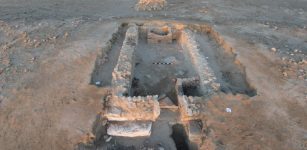 Unusually Arranged Skeletons And Artifacts Found Inside A 1,500-Year-Old Tomb In Berenice Troglodytica, Egypt
News | May 27, 2022
Unusually Arranged Skeletons And Artifacts Found Inside A 1,500-Year-Old Tomb In Berenice Troglodytica, Egypt
News | May 27, 2022 -
 Mystery Of The Ancient Unknown Mining Civilization In North America – Connecting the Dots – Part 2
Ancient Mysteries | Apr 23, 2022
Mystery Of The Ancient Unknown Mining Civilization In North America – Connecting the Dots – Part 2
Ancient Mysteries | Apr 23, 2022 -
 Tyrfing And Gram: Two Magical Swords And Hervor’s Death In Norse Mythology
Featured Stories | Apr 23, 2016
Tyrfing And Gram: Two Magical Swords And Hervor’s Death In Norse Mythology
Featured Stories | Apr 23, 2016 -
 On This Day In History: Ueshiba Morihei, The ‘Founder of Aikido’ Was Born – On Dec 14, 1883
News | Dec 14, 2016
On This Day In History: Ueshiba Morihei, The ‘Founder of Aikido’ Was Born – On Dec 14, 1883
News | Dec 14, 2016 -
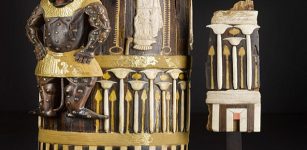 Ancient Egyptian Wooden Box Inscribed For Pharaoh Amenhotep II Is Now Restored
Archaeology | Mar 10, 2017
Ancient Egyptian Wooden Box Inscribed For Pharaoh Amenhotep II Is Now Restored
Archaeology | Mar 10, 2017 -
 Unorthodox Ancient ‘Out-Of-This World’ Carvings Were Found And Destroyed – Discovery – Part 1
Ancient Mysteries | Aug 10, 2020
Unorthodox Ancient ‘Out-Of-This World’ Carvings Were Found And Destroyed – Discovery – Part 1
Ancient Mysteries | Aug 10, 2020 -
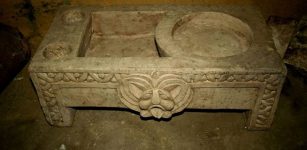 Roman-Era Residence Unearthed In Ancient Capital Of Memphis, Egypt
Archaeology | Sep 27, 2018
Roman-Era Residence Unearthed In Ancient Capital Of Memphis, Egypt
Archaeology | Sep 27, 2018 -
 The Lycurgus Cup: Fascinating Artifact That Reveals Prehistoric Knowledge Of Nanotechnology
Ancient Technology | Aug 2, 2018
The Lycurgus Cup: Fascinating Artifact That Reveals Prehistoric Knowledge Of Nanotechnology
Ancient Technology | Aug 2, 2018 -
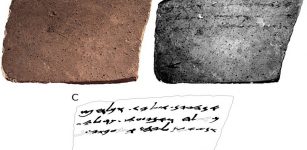 Unseen 3,000-Year-Old Inscription On Biblical-Era Piece Of Pottery Deciphered By Researchers
Archaeology | Jun 21, 2017
Unseen 3,000-Year-Old Inscription On Biblical-Era Piece Of Pottery Deciphered By Researchers
Archaeology | Jun 21, 2017 -
 Native Americans’ Unexplained Encounter With A Strange Underground Humanoid 500 Years Ago – Who Was This Being?
Featured Stories | Oct 31, 2024
Native Americans’ Unexplained Encounter With A Strange Underground Humanoid 500 Years Ago – Who Was This Being?
Featured Stories | Oct 31, 2024 -
 Unique Historical Discovery – Wreck Of Vasa’s Sister Ship Äpplet Found Off Swedish Coast!
Archaeology | Oct 25, 2022
Unique Historical Discovery – Wreck Of Vasa’s Sister Ship Äpplet Found Off Swedish Coast!
Archaeology | Oct 25, 2022 -
 Palatine Light Legend Is Based On A True And Tragic Event – What Really Happened On Block Island
Featured Stories | Dec 4, 2020
Palatine Light Legend Is Based On A True And Tragic Event – What Really Happened On Block Island
Featured Stories | Dec 4, 2020 -
 Ancient Mystery Of The Strange, Small Underground Being Who Secretly Emptied Casks
Featured Stories | Dec 8, 2024
Ancient Mystery Of The Strange, Small Underground Being Who Secretly Emptied Casks
Featured Stories | Dec 8, 2024 -
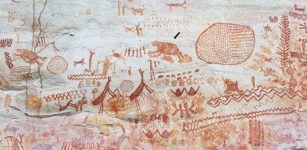 Puzzling Extinct Giants Depicted On 12,000-Year-Old Rock Paintings In The Colombian Amazon Rainforest Baffle Scientists
Archaeology | Mar 12, 2022
Puzzling Extinct Giants Depicted On 12,000-Year-Old Rock Paintings In The Colombian Amazon Rainforest Baffle Scientists
Archaeology | Mar 12, 2022 -
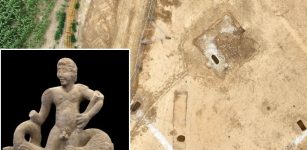 Spectacular Statue Of Sea God Triton Found In Roman Mausoleum In Kent
Archaeology | Sep 13, 2023
Spectacular Statue Of Sea God Triton Found In Roman Mausoleum In Kent
Archaeology | Sep 13, 2023 -
 Deadly Ancient Secrets Of Queen Hatshepsut’s Flacon
Artifacts | Mar 18, 2017
Deadly Ancient Secrets Of Queen Hatshepsut’s Flacon
Artifacts | Mar 18, 2017 -
 Undersea Scans Reveal Astonishing Ancient Submerged World Of The Adriatic Sea
Archaeology | May 11, 2024
Undersea Scans Reveal Astonishing Ancient Submerged World Of The Adriatic Sea
Archaeology | May 11, 2024 -
 Mysterious Pyramid-Shaped Tomb Discovered In China
Archaeology | Mar 15, 2017
Mysterious Pyramid-Shaped Tomb Discovered In China
Archaeology | Mar 15, 2017 -
 Obeah: Who Were The Feared Shadow Killers Of Jamaica?
Ancient Traditions And Customs | Sep 24, 2018
Obeah: Who Were The Feared Shadow Killers Of Jamaica?
Ancient Traditions And Customs | Sep 24, 2018

